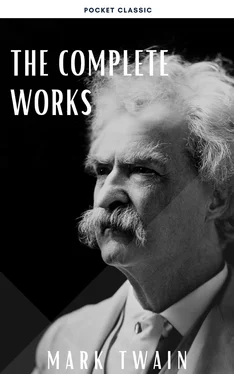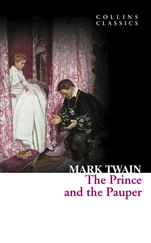Our friends threaded their way slowly through the throngs upon the bridge. This structure, which had stood for six hundred years, and had been a noisy and populous thoroughfare all that time, was a curious affair, for a closely packed rank of stores and shops, with family quarters overhead, stretched along both sides of it, from one bank of the river to the other. The Bridge was a sort of town to itself; it had its inn, its beer-houses, its bakeries, its haberdasheries, its food markets, its manufacturing industries, and even its church. It looked upon the two neighbours which it linked together—London and Southwark—as being well enough as suburbs, but not otherwise particularly important. It was a close corporation, so to speak; it was a narrow town, of a single street a fifth of a mile long, its population was but a village population and everybody in it knew all his fellow-townsmen intimately, and had known their fathers and mothers before them—and all their little family affairs into the bargain. It had its aristocracy, of course—its fine old families of butchers, and bakers, and what-not, who had occupied the same old premises for five or six hundred years, and knew the great history of the Bridge from beginning to end, and all its strange legends; and who always talked bridgy talk, and thought bridgy thoughts, and lied in a long, level, direct, substantial bridgy way. It was just the sort of population to be narrow and ignorant and self-conceited. Children were born on the Bridge, were reared there, grew to old age, and finally died without ever having set a foot upon any part of the world but London Bridge alone. Such people would naturally imagine that the mighty and interminable procession which moved through its street night and day, with its confused roar of shouts and cries, its neighings and bellowing and bleatings and its muffled thunder-tramp, was the one great thing in this world, and themselves somehow the proprietors of it. And so they were, in effect—at least they could exhibit it from their windows, and did—for a consideration—whenever a returning king or hero gave it a fleeting splendour, for there was no place like it for affording a long, straight, uninterrupted view of marching columns.
Men born and reared upon the Bridge found life unendurably dull and inane elsewhere. History tells of one of these who left the Bridge at the age of seventy-one and retired to the country. But he could only fret and toss in his bed; he could not go to sleep, the deep stillness was so painful, so awful, so oppressive. When he was worn out with it, at last, he fled back to his old home, a lean and haggard spectre, and fell peacefully to rest and pleasant dreams under the lulling music of the lashing waters and the boom and crash and thunder of London Bridge.
In the times of which we are writing, the Bridge furnished 'object lessons' in English history for its children—namely, the livid and decaying heads of renowned men impaled upon iron spikes atop of its gateways. But we digress.
Hendon's lodgings were in the little inn on the Bridge. As he neared the door with his small friend, a rough voice said—
"So, thou'rt come at last! Thou'lt not escape again, I warrant thee; and if pounding thy bones to a pudding can teach thee somewhat, thou'lt not keep us waiting another time, mayhap,"—and John Canty put out his hand to seize the boy.
Miles Hendon stepped in the way and said—
"Not too fast, friend. Thou art needlessly rough, methinks. What is the lad to thee?"
"If it be any business of thine to make and meddle in others' affairs, he is my son."
"'Tis a lie!" cried the little King, hotly.
"Boldly said, and I believe thee, whether thy small headpiece be sound or cracked, my boy. But whether this scurvy ruffian be thy father or no, 'tis all one, he shall not have thee to beat thee and abuse, according to his threat, so thou prefer to bide with me."
"I do, I do—I know him not, I loathe him, and will die before I will go with him."
"Then 'tis settled, and there is nought more to say."
"We will see, as to that!" exclaimed John Canty, striding past Hendon to get at the boy; "by force shall he—"
"If thou do but touch him, thou animated offal, I will spit thee like a goose!" said Hendon, barring the way and laying his hand upon his sword hilt. Canty drew back. "Now mark ye," continued Hendon, "I took this lad under my protection when a mob of such as thou would have mishandled him, mayhap killed him; dost imagine I will desert him now to a worser fate?—for whether thou art his father or no—and sooth to say, I think it is a lie—a decent swift death were better for such a lad than life in such brute hands as thine. So go thy ways, and set quick about it, for I like not much bandying of words, being not over-patient in my nature."
John Canty moved off, muttering threats and curses, and was swallowed from sight in the crowd. Hendon ascended three flights of stairs to his room, with his charge, after ordering a meal to be sent thither. It was a poor apartment, with a shabby bed and some odds and ends of old furniture in it, and was vaguely lighted by a couple of sickly candles. The little King dragged himself to the bed and lay down upon it, almost exhausted with hunger and fatigue. He had been on his feet a good part of a day and a night (for it was now two or three o'clock in the morning), and had eaten nothing meantime. He murmured drowsily—
"Prithee call me when the table is spread," and sank into a deep sleep immediately.
A smile twinkled in Hendon's eye, and he said to himself—
"By the mass, the little beggar takes to one's quarters and usurps one's bed with as natural and easy a grace as if he owned them—with never a by-your-leave or so-please-it-you, or anything of the sort. In his diseased ravings he called himself the Prince of Wales, and bravely doth he keep up the character. Poor little friendless rat, doubtless his mind has been disordered with ill-usage. Well, I will be his friend; I have saved him, and it draweth me strongly to him; already I love the bold-tongued little rascal. How soldier-like he faced the smutty rabble and flung back his high defiance! And what a comely, sweet and gentle face he hath, now that sleep hath conjured away its troubles and its griefs. I will teach him; I will cure his malady; yea, I will be his elder brother, and care for him and watch over him; and whoso would shame him or do him hurt may order his shroud, for though I be burnt for it he shall need it!"
He bent over the boy and contemplated him with kind and pitying interest, tapping the young cheek tenderly and smoothing back the tangled curls with his great brown hand. A slight shiver passed over the boy's form. Hendon muttered—
"See, now, how like a man it was to let him lie here uncovered and fill his body with deadly rheums. Now what shall I do? 'twill wake him to take him up and put him within the bed, and he sorely needeth sleep."
He looked about for extra covering, but finding none, doffed his doublet and wrapped the lad in it, saying, "I am used to nipping air and scant apparel, 'tis little I shall mind the cold!"—then walked up and down the room, to keep his blood in motion, soliloquising as before.
"His injured mind persuades him he is Prince of Wales; 'twill be odd to have a Prince of Wales still with us, now that he that WAS the prince is prince no more, but king—for this poor mind is set upon the one fantasy, and will not reason out that now it should cast by the prince and call itself the king… If my father liveth still, after these seven years that I have heard nought from home in my foreign dungeon, he will welcome the poor lad and give him generous shelter for my sake; so will my good elder brother, Arthur; my other brother, Hugh—but I will crack his crown an HE interfere, the fox-hearted, ill-conditioned animal! Yes, thither will we fare—and straightway, too."
Читать дальше










